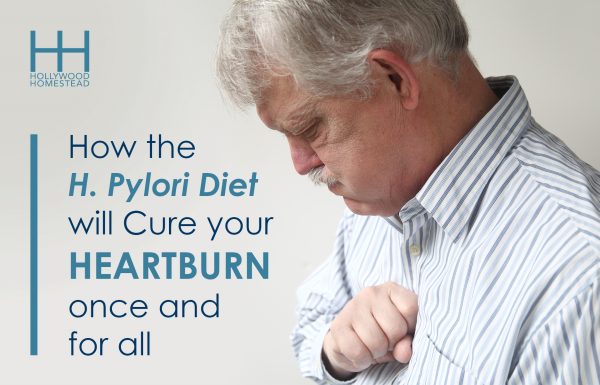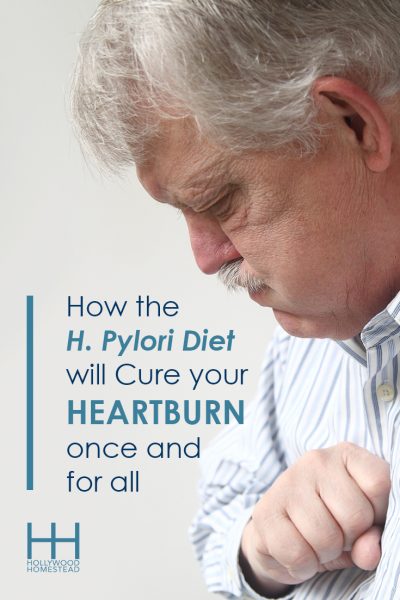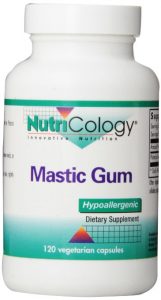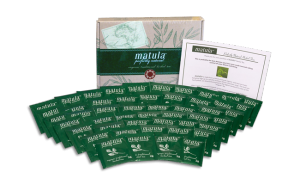
I want to start by noting what amazing gains the medical community has made in recent years. Not that long ago, doctors dismissed heartburn and ulcers as “caused by stress.” For the patients suffering these painful, debilitating conditions, this diagnosis was not only useless at guiding them towards a cure, but also made patients feel responsible for their own suffering.
While stress can certainly aggravate symptoms and be a contributing factor, we now know that the root cause is often an infection by the bacteria Helicobacter pylori.
UPDATE: Good news! There is now an h. pylori test that you can order directly without a doctor’s order! While I’m a HUGE fan of having a doctor’s guidance, I understand the need to know whether you have h. pylori or not before you invest in a practitioner.
- USA: Order the test here
- Europe: Order the test here
The Link between Heartburn, Ulcers and H. Pylori
Researchers still aren’t in 100% agreement about how h. pylori causes ulcers. However, the leading theory has to do with how the bacteria burrows itself into the lining of the stomach. The mucus that makes up the stomach lining gets damaged, causing the stomach’s acid to damage its own cells and cause an ulcer.
The link between h. pylori and heartburn isn’t talked about as much. Maybe it is because acid reflux/heartburn drugs are a $13 billion industry… I won’t get into that now though!
Despite the prevailing myth, too much stomach acid does NOT cause heartburn. Rather, heartburn is caused by too little stomach acid.
When you have too little stomach acid in your body, the body is not able to adequately break down the food you eat. The poorly-digested food causes pressure to build up on your esophageal valve. Normally this valve does a good job of keeping stomach acid in your stomach. But, if the acid gets into your esophagus, it causes those terrible heartburn symptoms.
Stomach acid is also important to control bacteria levels in the stomach. Low stomach acid would result in an overgrowth of bacteria, which in turn causes gases and pressure on your stomach. The end result is more inflammation and stomach acids pushed into your esophagus where they don’t belong.
For more on the true cause of heartburn, I suggest you read this great article by Chris Kresser.
Here’s the thing:
H. pylori not only damages the stomach lining (and causes ulcers), but it secretes enzymes to reduce stomach acid levels (to help it survive better in the acidic environment). H. pylori is also proven to cause inflammation and gastritis. (Source)
Thus, as Dr. Mercola says,
“(H. pylori) is responsible, or at least a major factor, for producing many of the symptoms of acid reflux.”
If you have an h. pylori infection, it is something to take seriously! But before you take the hardcore approach of using antibiotics, consider an h. pylori diet instead.
Why Use the H. Pylori Diet?
As I talk about in detail in my post on How to Treat H. Pylori Naturally, the typical approach to treating h. pylori infections is to use two antibiotics along with a proton pump inhibitor.
There are a lot of reasons why you might want to avoid this traditional antibiotic treatment for h. pylori.
Antibiotic Resistance:
H. pylori has a poor rate of responding to antibiotic treatment (about 35% of cases fail). A major reason for this has to do with antibiotic resistance.
Because the drugs also cause some terrible side effects (bloating, diarrhea, taste disturbances), patients often fail to take the entire course of antibiotics – which in turn causes the h. pylori bacteria to develop more of an antibiotic resistance. (Source)
Gut Flora Disturbances
While we don’t think about them often, our bodies are being helped every day by an “army” of bacteria that live within us. There are about 10 trillion of them in our intestines alone – which is about 10x the number of cells in our body!
These bacteria perform roles like breaking down carbohydrates, converting food into nutrients, and building immunity.
The recent research into gut flora is absolutely fascinating. For example, researchers have been able to create depression in rats by transferring bacteria from a sick rat into a healthy rat. Equally as fascinating is that they’ve been able to cure depression (as well as other diseases) by transferring a sample of bacteria from a healthy rat into the sick rat.
By taking antibiotics to treat h. pylori, you will be destroying your gut flora. Your gut flora might never recover. Just some of the problems linked to gut flora disturbances are:
To learn more, read this article on Gut Flora Dysbiosis.
Also note that typical h. pylori treatment involves a proton pump inhibitor (PPI). PPIs work by decreasing the amount of stomach acid in the body. As talked about above, low stomach acid actually causes heartburn. PPIs are great at reducing heartburn symptoms because you won’t have so much acid going into your esophagus, but they just exacerbate the problem in the long run.
H. Pylori Might Be “Normal” in the Digestive Tract
The h. pylori bacteria has coexisted with man for at least 58,000 years. Just like with the multitude of other bacteria which reside in our bodies, there might be a yet-unknown benefit of having some h. pylori.
For example, eradication of h. pylori has been known to cause asthma in patients. It is also thought to protect against cholera.
Thus, completely eradicating h. pylori with antibiotics might not be the best solution. Instead, reducing h. pylori levels using natural treatments such as diet could be the better approach. (Source 1, 2)
H. Pylori Diet Foods to Avoid
As far as foods to avoid with h. pylori go, there are two things you need to keep in mind. First, there are the foods which are actually associated with causing h. pylori. Second, there are foods that aggravate your stomach and cause inflammation, thus worsening heartburn as well as ulcers.
AVOID:
- Refined Sugars: Refined sugar is terrible for your body on multiple levels. As far as h. pylori diet goes, sugars will cause inflammation and increase symptoms. Sugar is also the food for many “bad” bacteria in your gut and can cause SIBO.
- Starchy Foods: Starchy foods like cereals and potatoes are just a lesser-evil form of refined sugar. Studies have found that h. pylori is more prevalent in patients who have higher daily intake of starchy foods.
- Dairy: Dairy is another pro-inflammatory food and studies have also found a correlation of consuming dairy (particularly milk) with h. pylori infection.
- Salty Foods: Researchers have found that consuming salt in combination with a h. pylori infection results in inflammation and means that the bacteria is much more likely to cause stomach cancer.
H. Pylori Diet Foods to Eat
There is now a lot of research about how certain foods or chemicals in foods can “cure” h. pylori. I write “cure” because scientific studies do not give definitive results. All they can show is that there is a correlation between the food being studied and the outcome.
Further, there is a big difference between “reducing levels” and “eradicating” or “curing” h. pylori. So, be vary of article which claims that a certain food will cure h. pylori. To get results with any natural treatment method, you’ll probably need to combine multiple approaches including good diet and numerous of these foods.
- Cranberry: This is one of the most-studied natural treatments for h. pylori. The results are varied with some studies showing great benefits and others no benefit or marginal benefits. Remember that traditional cranberry juices are loaded with sugar and preservatives. Opt for fresh cranberries or a reliable supplement if you want to include this in your h. pylori diet.
- Broccoli: A compound in broccoli called isothiocyanate sulphoraphane is known to be a potent bactericide for reducing h. pylori levels. In studies, broccoli sprouts give the best results. Source Naturals makes a good broccoli sprouts supplement which you can buy here.
- Certain Fatty Oils: Fatty acids effect cellular actions in our bodies. One of the recent actions that is being studied is how fatty acids can act as antibacterial agents. Studies have found that fatty acids – such as olive oil – can inhibit h. pylori. Note that omega 3 to omega 6 ratio is very important in reducing inflammation. Thus, don’t use this as an excuse to gorge on fatty foods! My favorite is fermented cod liver oil which you can buy here.
- Green Tea: Green tea inhibits the amount of urease produced by h. pylori, thus helping normalize stomach acid levels so h. pylori can’t proliferate.
- Fermented Foods: I personally love fermented foods and beverages like kombucha and have long promoted their health benefits. Because fermented foods are rich sources of “healthy” bacteria, they help control levels of “bad” bacteria.
- Licorice Root: Flavonoids found in licorice root (which has long been used to treat GI ailments) have been shown to inhibit h. pylori colonization in the gastric mucus. It might also help prevent reinfection of h. pylori after treatment. You can make tea out of licorice. Here is where to buy organic licorice root.
- Manuka Honey: There have been numerous studies which showing the effectiveness of Manuka honey as a natural antibiotic, including against h. pylori. Note that Manuka honey is unique in that it is produced from bees feeding on the Manuka bush in New Zealand. It should be raw and unfiltered to produce benefits. I like this manuka honey.
- Nigella Sativa: Also known as black cumin seed, I personally have used this natural antibiotic for treating histamine intolerance It has shown to have in vitro anti-helicopter pylori properties. You can buy it here.
- Garlic Extract: Garlic is one of the best-known natural antibiotics. In numerous studies, it was shown to reduce or eradicate h. pylori. Note that studies using sliced fresh garlic didn’t show results. Dosages of 4mg garlic oil did give results.
- Spirulina and Chlorella: Polysaccharidesderived from these algae prevented h. pylori from binding to the stomach mucus. In animal studies, they have reduced h. pylori infection by greater than 90%.
- Probiotics: Probiotics are “good” bacteria in your body. In addition to their many other roles, they help control levels of “bad” bacteria. Some of the probiotics shown effective in reducing h. pylori are Bifidobacterium, Lactobacillus acidophilus, Lactobacillus casei strain Shirota, Bacillus subtilis, and Weissella confusa
(Source 1, 2, 3, 4, 5, 6, 7, 8)
Two Powerful Natural Supplements for Killing H. Pylori
By far the most popular natural h. pylori treatments (and probably the most effective) are mastic gum and matula tea.
I talk about these in my post about How to Treat H. Pylori Naturally.
Mastic Gum:
This is a resin from the pistachio tree. Even small amounts of the gum have been proven to kill h. pylori. You can learn more about mastic gum here. The recommended dosage is:
- Week 1: 1000mg of mastic gum daily on an empty stomach
- Week 2: 2000mg of mastic gum daily, divided into two dosages taken on an empty stomach (take in the morning and afternoon)
- Week 3:3000mg of mastic gum daily, divided into three dosages taken on an empty stomach (morning, afternoon, and evening)
***You can buy mastic gum here***
Matula Tea:
This tea is actually made up of several herbs which work together to kill h. pylori. I personally have had success in treating h. pylori naturally using this tea. I drank two cups daily for 30 days and had a negative breath test for h. pylori afterwards.
***You can buy Matula Tea here***
Have you been diagnosed with h. pylori and are trying to treat it naturally? I’d love to hear how it is going for you! Feel free to comment below.

Latest posts by Sylvie McCracken (see all)
- Treating H. Pylori (Part 3): What H. Pylori Does to the Body - August 8, 2022
- Treating H. Pylori (Part 2): How H. Pylori is Contracted - August 3, 2022
- Understanding Beef Labels: Organic, Pastured, Grass-Fed & Grain-Finished - July 25, 2022


Baking soda calms ulcer problems, so in short term it is ok, but in long term it is lowering the acidity of your stomach so it will result in an increase of H Pylori in your stomach.
Had H. Pylori in my college years, killed it by taking NAC, the Matula tea protocol (other natural methods didn’t work), and avoiding grains, sugars, processed foods, starches. I had tried two other hardcore natural methods but after Matula worked never went back. Pricy, but should have started with that first as it worked well with my diet.
Ever heard of baking soda. Cure for all over acidic problems. Use it in all the so called spring water, and or filtered water due to the high acidity. Real spring water is pretty close to netural.
I am suffering from h pylori I am continues in pain and bloated
Thank you for the article. I am now on my second treatment with the Pylera Capsules. I would like to be proactive heal this time around. My question is, could I take all the natural remedies above during my prescribed treatment?
I would really like to know more about how you overcame crohn’s disease. My daughter suffers horrifically from it, we’ve tried everything
Gut Flora Disturbances caused by antibiotics can be wasy to get over but what about the heavy bacteria on our skin killed from those same pills? Be smart and DIY apple cider vinegar (RAW) ACV or buy kabocha tea and after a bath ir shower (hopefully a Epsom salt bath with acv in it) take the mother from the ACV and rub it on your skin, rub on the tea or acv liquid leave it on and let it soak in… It helps restore the largest organ on your body. Peace
PS I had H. Pylori twice… that is Correct you can catch it multiple times.
Regarding the salt and dairy you mention as being inflammatory, are you including raw milk/products and Himalayan/Celtic sea salt as inflammatory as well?
+Carey, Very intelligent question. Dairy can be a problem wgen peoples diet includes 10 to 20 % and it’s not witg raw milk… I think raw milk is very smart however limit the dairy use to bo more then 5% total diet and limit heavily processed dairy. Omit as much table salt from your diet as you can and/or processed food. Pink or sea salt needs to be tge replacement used. Many havr 90 to 120 minerals that help swelling and gives the body what it needs. I am the only one ever that beat Chrones/ Crohn’s disease but what do I know? Rge internet is full of good and bad advice…. I know people will say “You never had Crohns” and even my Doctor who is the best couldn’t believe the tests and his eyes, in fact he labeled me an enigma. But I am telling you all you are no different them me and anything is possible.. Peace